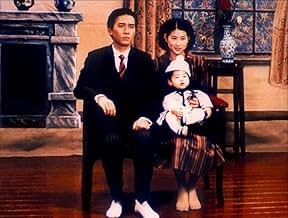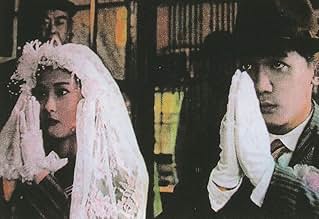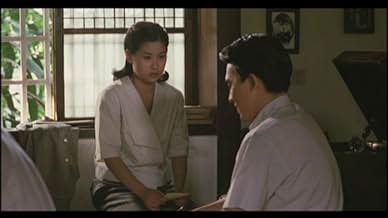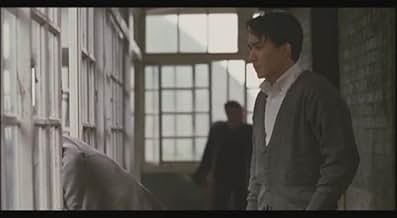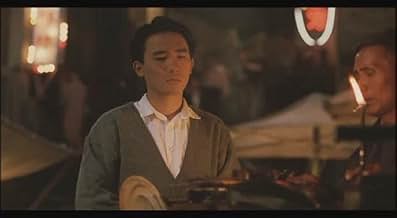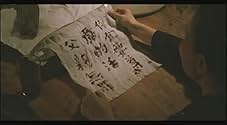NOTE IMDb
7,8/10
6,6 k
MA NOTE
L'histoire d'une famille mêlée à la "terreur blanche" que le gouvernement du Kuomintang a fait subir aux Taïwanais après leur arrivée de Chine continentale à la fin des années 1940.L'histoire d'une famille mêlée à la "terreur blanche" que le gouvernement du Kuomintang a fait subir aux Taïwanais après leur arrivée de Chine continentale à la fin des années 1940.L'histoire d'une famille mêlée à la "terreur blanche" que le gouvernement du Kuomintang a fait subir aux Taïwanais après leur arrivée de Chine continentale à la fin des années 1940.
- Réalisation
- Scénario
- Casting principal
- Récompenses
- 8 victoires et 6 nominations au total
Tony Leung Chiu-wai
- Wen-ching
- (as Tony Chiu Wai Leung)
Tien-Lu Li
- Ah-lu
- (as Tian-Lu Li)
Avis à la une
This is the only one of Hou Hsiao-hsien's films I caught at a retrospective of his work, and it's a tragedy because this film is so incredibly good. Hou's rigorous formal approach (highly geometrical framing, repetitive shots along axes, distinctive use of lived-in colors) provides a framework for the film to operate within its own world. Whereas Coppola's "Godfather" goes this way and that, without a significant coherence, visually or rhythmically, "City of Sadness" feels like an elegy to Taiwan and the family (in much the same way that "Underground" is an ode to what was once Yugoslavia). At times funny, sorrowful, and invigorating, I suppose that what makes this film so special is that it refuses to operate in "big moments" and focuses, like Ozu (who Hou is often compared to) on the little events that make life what it really is.
A previous poster described this film as a Taiwanese Godfather, but better. Indeed, this film has a lot similarities to godfather, in which the most notable is the condensation of an entire nation into the life of one single family. Even though I never really come to love other Hou's films, City of Sadness is a flawless epic that truthfully depict an era that is forgotten by most of my generation. I have heard those stories from my paternal grandparents, who are like people portrait in the film, grass root Taiwanese. I have also heard stories from my maternal grandparents, who are the late comers from mainland China. The entire different perspectives surprised me that in such a small nation, mistrust is still profoundly rooted and transmitted via generations. City of Sadness portraits this image so hauntingly and yet with beautiful and quiet transcendence seeing the turmoil through the eyes of the deaf and mute son of the Lin family. Taiwan, the city of sadness, is eternally sorrowful because of its rootlessness, which until today, still runs in my blood.
A movie beyond its cinematic presence, but matters also the director's outlook and the audience's interpretation - in plain words, you would give it a much higher rating if someone explains you it's historical context. Surprisingly, I find Tony Leung's performance in this film decent and slightly bland, maybe because his other works are simply too good, or maybe the performance of this movie across the board is all too flawless. As the eldest son myself, I specifically appreciated the character Wen-heung, a boisterous, truculent, and rugged man, yet also interestingly a child carer, a family adhesive, and a natural leader, whose unconstrained aggression engenders one's own tragedy. Regarding the movie itself, non-linear editing, picturesque sceneries, and long, still frames generate versatile atmospheres with a unique artistry. Also a historic fiction, the film gradually unravels an era of generational trauma using convoluted storylines and symbolic characters. In times of turmoil, perhaps it would be better if we are as deaf as Wen-ching or as bewildered as Wen-leung, like yielding grass that lives through scything gales. Definitely one of the most important chinese cinematic tribute worthy of deep-dive analyses and global recognition.
Artistically, its greatness is not in dispute, but it is hard to overstate the importance of this film in political and social terms for Taiwan. The subject of the film, the February 28 Incident (the massacre of 20000 or more Taiwanese by Chinese Nationalist troops in 1947) had been completely been banned from public discussion by the now-defunct military government of Taiwan up until 1988 - only a year and a half before the film was released. To intervene so powerfully in a period of political and social change as Taiwan's democratic revolution in the late 1980s, makes the film as dramatic a re-configuring of a country's cultural landscape as any film has ever achieved.
On the evening of February 27th, 1947 in Taipei, police ruthlessly beat a woman selling illegal cigarettes and the next day opened fire on a protest demonstration outside the Presidential Palace. Years of resentment against a government increasingly defined by nepotism, corruption, and suppression of human rights exploded in open conflict. As soon as the troops arrived, they began the systematic round up and execution of scholars, lawyers, doctors, students and local leaders of the protest movement. In total between 18,000 and 28,000 people were murdered by Chinese troops sent from the mainland by Chiang Kai-shek. Thousands of others were arrested and imprisoned and martial law was established in what became known as the "White Terror" campaign.
Hou Hsiao-hsien's magnificent 1989 film, City of Sadness, brings to light the truth about the 1947 massacre known as the 2/28 incident. Winner of the Golden Lion Award at the 1989 Venice Film Festival, City of Sadness treats one of the key issues of Taiwanese history, yet is far from being a political film. Its focus is not on the bloodshed but on the consequences for a particular family and how individual experience is impacted by the flow of time and history. In the film, Wen-heung (Chen Sown-yung), the oldest of four Lin brothers, tries to hold the family together with the support of Ah-lu (Li Ten-lu), the family patriarch. A brutish, feverishly emotional man, he has turned his Japanese bar into a family restaurant known as "Little Shanghai" but finds his business undermined by ruthless Shanghai gangsters. The second brother, Wen-sun disappeared in the Philippines and is talked about but never seen in the film.
Brother number three, Wen-leung (Jack Gao) suffered mental problems as a direct result of the war and is bedridden at a local hospital. Amazingly, he recovers enough to deal with Shanghai drug smugglers but is framed as a Japanese collaborator and, after being beaten in prison, loses his mental balance again. The fourth Lin brother, Wen-ching is deaf and runs a photography studio. Wen-ching is involved with young anti-government socialists such as his friend Hinoe (Wu Yi-fang) who is forced to flee to the mountains to join the guerillas. Wen-ching also wants to join the movement but is persuaded to stay home and care for Hinoe's sister, Hinome (Hsin Shu-fen), a nurse, who loves him.
As in all of Hou's films, there are no peak moments of dramatic interest to which everything else is simply a build up. The camera simply records the events from a distance without judgment or evaluation, allowing the complexities of the characters and situations to gradually unfold. Everything is relevant -- taking care of the baby, eating, cleaning the floor, and washing the dishes. This attention to the ordinary makes us realize that history happens to everyone, not only in the battlefield, but also in the quiet of everyday life. Far from being bogged down in banality, however, the film achieves transcendence in moments such as Hinome and Wen-ching listening to a German folk song, Wen-ching imitating the voice of an opera singer when he was only eight, the solitary flight of a bird after a sudden death, and the gentle caressing voiceover of Hinome.
City of Sadness is a remarkable portrait of one of the most traumatic events in Taiwanese history and its popularity in Taiwan reflected its willingness to deal with a previously taboo subject. Hou said, "I didn't make A City of Sadness because I purposely wanted to open up old wounds'.but because I know that we have to face ourselves and our history if we are ever to understand who we are and where we're going." Though the film was criticized by some for being "politically ambiguous" and "historically inaccurate, the film's depiction of political events and its impact on Taiwan is clear and unmistakable. City of Sadness will not satisfy those seeking a political expose, but Hou's refusal to trivialize events for the sake of emotional appeal gives the film a universality of spirit that ensures its place among the most powerful cinematic statements of our time.
Hou Hsiao-hsien's magnificent 1989 film, City of Sadness, brings to light the truth about the 1947 massacre known as the 2/28 incident. Winner of the Golden Lion Award at the 1989 Venice Film Festival, City of Sadness treats one of the key issues of Taiwanese history, yet is far from being a political film. Its focus is not on the bloodshed but on the consequences for a particular family and how individual experience is impacted by the flow of time and history. In the film, Wen-heung (Chen Sown-yung), the oldest of four Lin brothers, tries to hold the family together with the support of Ah-lu (Li Ten-lu), the family patriarch. A brutish, feverishly emotional man, he has turned his Japanese bar into a family restaurant known as "Little Shanghai" but finds his business undermined by ruthless Shanghai gangsters. The second brother, Wen-sun disappeared in the Philippines and is talked about but never seen in the film.
Brother number three, Wen-leung (Jack Gao) suffered mental problems as a direct result of the war and is bedridden at a local hospital. Amazingly, he recovers enough to deal with Shanghai drug smugglers but is framed as a Japanese collaborator and, after being beaten in prison, loses his mental balance again. The fourth Lin brother, Wen-ching is deaf and runs a photography studio. Wen-ching is involved with young anti-government socialists such as his friend Hinoe (Wu Yi-fang) who is forced to flee to the mountains to join the guerillas. Wen-ching also wants to join the movement but is persuaded to stay home and care for Hinoe's sister, Hinome (Hsin Shu-fen), a nurse, who loves him.
As in all of Hou's films, there are no peak moments of dramatic interest to which everything else is simply a build up. The camera simply records the events from a distance without judgment or evaluation, allowing the complexities of the characters and situations to gradually unfold. Everything is relevant -- taking care of the baby, eating, cleaning the floor, and washing the dishes. This attention to the ordinary makes us realize that history happens to everyone, not only in the battlefield, but also in the quiet of everyday life. Far from being bogged down in banality, however, the film achieves transcendence in moments such as Hinome and Wen-ching listening to a German folk song, Wen-ching imitating the voice of an opera singer when he was only eight, the solitary flight of a bird after a sudden death, and the gentle caressing voiceover of Hinome.
City of Sadness is a remarkable portrait of one of the most traumatic events in Taiwanese history and its popularity in Taiwan reflected its willingness to deal with a previously taboo subject. Hou said, "I didn't make A City of Sadness because I purposely wanted to open up old wounds'.but because I know that we have to face ourselves and our history if we are ever to understand who we are and where we're going." Though the film was criticized by some for being "politically ambiguous" and "historically inaccurate, the film's depiction of political events and its impact on Taiwan is clear and unmistakable. City of Sadness will not satisfy those seeking a political expose, but Hou's refusal to trivialize events for the sake of emotional appeal gives the film a universality of spirit that ensures its place among the most powerful cinematic statements of our time.
Le saviez-vous
- AnecdotesIn 1989, Hou Hsiao-hsien's A City of Sadness, the first film to touch on the 228 Incident, a taboo subject in Taiwan, became a big hit in the theaters. As a result Jioufen, where the film was set, revived due to the film's popularity. The nostalgic scenery of Jioufen as seen in the film, as well as appearances in other media, charmed many people into visiting Jioufen. For the beginning of the 90s, Jioufen experienced a tourist boom that has shaped the town as a tourist attraction. Soon retro-Chinese style cafés, tea houses, and souvenir stores bearing the name "City of Sadness" were built.
- ConnexionsFeatured in When Cinema Reflects the Times: Hou Hsiao-Hsien and Edward Yang (1993)
Meilleurs choix
Connectez-vous pour évaluer et suivre la liste de favoris afin de recevoir des recommandations personnalisées
- How long is A City of Sadness?Alimenté par Alexa
Détails
Box-office
- Montant brut mondial
- 143 169 $US
Contribuer à cette page
Suggérer une modification ou ajouter du contenu manquant


